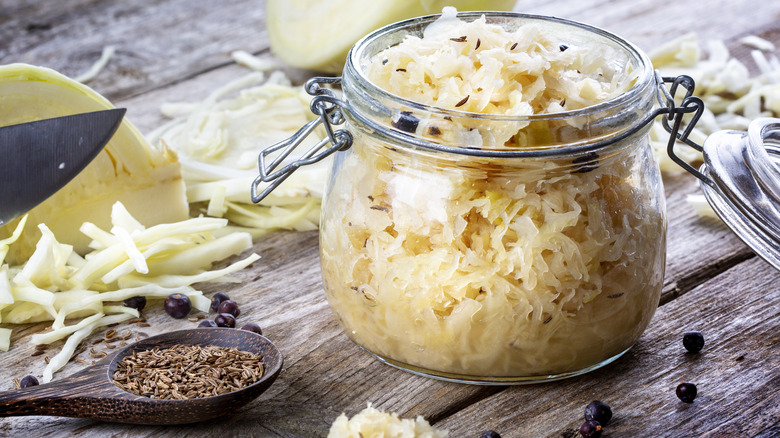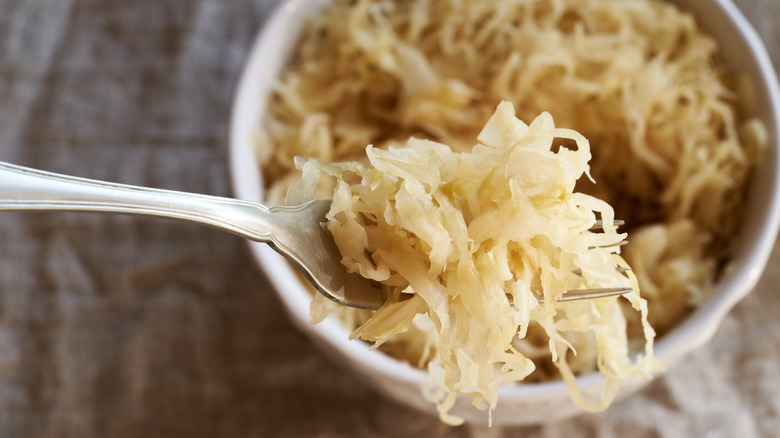Here's How Long That Sauerkraut Is Good For After Opening
If you love fermented foods, you'll know that there's plenty about them to appreciate. In addition to the unparalleled tartness and flavor they can add to any dish they're included in, there's also the fact that they're associated with things like the improvement of digestive health and a lowered risk of heart disease. There's also the preservative qualities of the fermentation process, which was a huge deal — especially before refrigeration. Sauerkraut has long been a great way of extending the longevity of cabbage, but what does that mean for that jar of sauerkraut that you opened the other day for some delicious Reuben-style brats?
The straightforward answer is that there are two ways to make sauerkraut; pasteurized and unpasteurized (raw). Once opening a shelf-stable pasteurized bottle you only have three or four weeks to use it (from the fridge), while an unpasteurized sauerkraut will last four to six months. That might sound counterintuitive, but there's good reason. Since there are plenty of surprising ways to add more sauerkraut to your meals — including fun ideas like using it to make a unique grilled cheese or salad — you'll have plenty of opportunities to use it up before it goes bad.
But what about when you're approaching the cut off? Sauerkraut is a little funky by nature, but fortunately, there are some telltale signs that you should probably think about throwing it away and opening a new jar.
Here's how long that sauerkraut lasts
Let's start with unopened sauerkraut. If you happen to find a good deal on sauerkraut and wonder if you should stock up, you absolutely should. Because sauerkraut undergoes a fermentation process, that's eliminated any of the pesky microorganisms that are typically responsible for spoiling foods. That means it's entirely possible that a jar or package of unopened sauerkraut is going to be perfectly fine to eat past the expiration date. A few months have gone by? It's all good!
Now, what about after it's opened? That's where it gets a little tricky, and you'll have to look at the type of sauerkraut you're using to know just how long it's going to last. If the sauerkraut is labeled as raw, unpasteurized, or natural, it's actually going to last longer than a pasteurized counterpart. That seems to run contradictory to what we've always been told about the pasteurization process, but since pasteurized sauerkraut doesn't need to be stored in the fridge, that means it should be eaten three to four weeks after opening it. Beyond that, it's going to start to dry out and could start spoiling.
Raw, unpasteurized sauerkraut is kept in the fridge, and that can last four to six months. However, there's always the potential for microbes to be introduced to the jar — oftentimes on the utensils used to scoop some out — and if they start to grow, it's game over.
Here's how to tell sauerkraut has spoiled, and what to do first
Yes, sauerkraut can definitely go bad, even though the fermentation process kills off the microorganisms that are responsible for food spoiling. (As an interesting side note, it's worth mentioning that fermentation doesn't mean it's bacteria-free. It's good bacteria called lactic acid bacteria that's the driving force behind fermentation, and it's this bacteria that ultimately takes up residence in your gut microbiome.)
Sauerkraut that's going bad will start to have an off odor: The pleasantly pungent smell of sauerkraut might start to smell a little like mold, or yeast. Sauerkraut that has dried out is also on its way out, and if it sits for too long, it can definitely start to grow mold. If your sauerkraut looks like it's got a weird texture and if it's looking a little fuzzy, don't eat it.
Fortunately, there's one great way to preserve it even farther before this happens, and yes, sauerkraut is still perfectly good to eat after it's been frozen. There are some things to keep in mind, though, including the fact that freezing sauerkraut can kill off many of those good probiotics that it's so prized for. If you do decide to freeze it, keep in mind that you shouldn't leave it in the freezer for long. Although it can be good for up to a year when frozen, you should try to use it ASAP to preserve as much of the probiotic goodness as you can.


